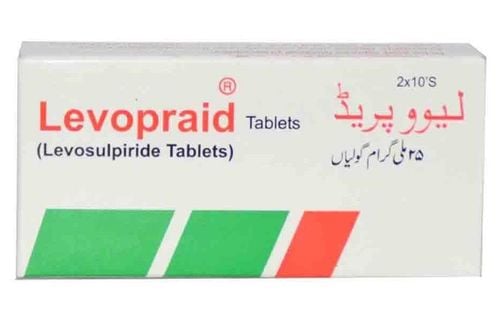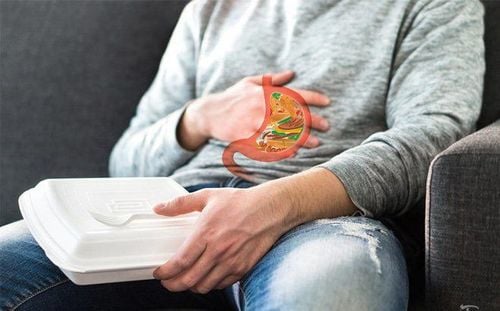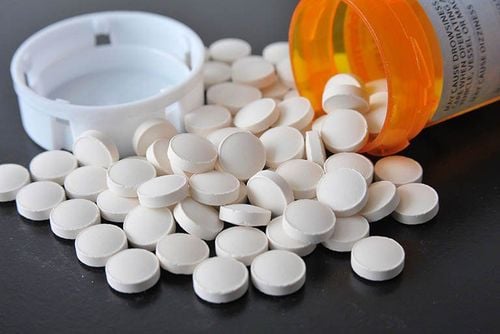This is an automatically translated article.
The article is professionally consulted by Doctor Vo Thi Thuy Trang - Gastrointestinal Endoscopy - Department of Medical Examination & Internal Medicine - Vinmec Da Nang International Hospital.Non-ulcer dyspepsia is a condition that frequently causes abdominal pain and other unpleasant symptoms in the epigastrium. The cause is often unclear, nor can the lesion be found on tests. Although it does not cause serious harm, non-ulcer dyspepsia affects the patient's quality of life more or less.
1. What is functional dyspepsia?
Indigestion is a term that describes the set of symptoms that occur in the esophagus, stomach, and duodenum (the first part of the small intestine). In which, non-ulcer dyspepsia or functional dyspepsia is a diagnosis made when a patient has symptoms of dyspepsia for which no specific physical cause can be found.Functional dyspepsia is a very common problem. Up to 6 out of 10 people who experience indigestion are diagnosed with nonulcer dyspepsia. Although the disease is not dangerous, it sometimes reduces the quality of life. This condition usually affects younger people rather than older people, and women are affected more often than men.
2. Symptoms of functional dyspepsia
Symptoms of functional dyspepsia (non-ulcer dyspepsia) include obvious or sometimes very vague discomfort in the upper abdomen that ranges in severity from mild to severe. Patients presenting to the clinic describe their discomfort as burning sensation, nausea, vomiting, belching, flatulence, and feeling full soon at the beginning of a meal or discomfort after a meal.The common feature of these symptoms is that they often come and go, sometimes several days in a row, or occasionally a single episode. In particular, the expression will be worse after eating a hearty meal, eating too quickly or eating right before going to bed, or the patient is having stress, psychological disorders. At this time, the patient feels the pain comes from the upper abdomen, spreads to the middle of the chest, the area behind the sternum, into the neck or through the back, which is easy to confuse with the dangerous cardiovascular pain, requiring Patients must be hospitalized for intervention.

3. Causes of functional dyspepsia
The cause of functional dyspepsia is currently unclear. Some patients may develop this condition when it has the same cause as irritable bowel syndrome. Some evidence still supports the hypothesis that Helicobacter pylori infection causes non-ulcer dyspepsia; However, at present, it has not been shown that HP eradication therapy has any benefit in improving these unpleasant symptoms.Here are some factors that have been documented to make non-ulcer dyspepsia symptoms worse:
Food and lifestyle: Food can make symptoms worse including caffeine, spicy, strong, acidic, fatty, minty, carbonated, alcoholic, hot drinks, coffee and even chocolate... It's important to remember that sensitivity before each food is completely different for each patient. In addition, a lifestyle with a habit of smoking, drinking alcohol, being overweight, often having to worry or stress is also difficult to avoid indigestion symptoms; Medications: These include anti-inflammatory drugs (eg, ibuprofen, naproxen, and aspirin) and drugs that affect esophageal motility (nitrates). In addition, many other drugs can also cause indigestion side effects such as some families of antibiotics, steroids, iron, calcium antagonists, theophyllines and bisphosphonates; however, for the benefit of the medicine, sometimes you still need to take it. Therefore, if there is concern that medications may cause intestinal upset, let your doctor know about this to be supplemented with medications to support the digestive system; Irritable Bowel Syndrome: Up to 1 in 3 people with non-ulcer dyspepsia also have IBS at the same time. Symptoms of this syndrome include abdominal pain, bloating, change in frequency and nature of bowel movements, and a sensation that remains immediately after defecation.

4. How to diagnose functional dyspepsia?
As there is no single and specific cause of functional dyspepsia, the disorder is diagnosed when other organic causes of dyspepsia such as ulceration, inflammation, gastroduodenal reflux disease, hernia or Helicobacter pylori infection was ruled out.This means that the patient needs to perform all basic tests to investigate the gastrointestinal tract such as abdominal ultrasound, endoscopy, breath test for Helicobacter pylori, stool test, blood test; X-ray with drinking barium and CT scan and the results were both proven negative.
Moreover, functional dyspepsia is often less thought of and is only actively diagnosed when the patient is accompanied by the following signs: first onset, appearing when over 60 years of age , weight loss, vomiting or bloody stools, and a personal or family history of gastrointestinal cancer.
In summary, functional dyspepsia is one of the common upper gastrointestinal disorders, especially in today's stressful modern life. However, the diagnosis is to rule out other organic causes. Therefore, when there are signs of slow digestion, causing discomfort, patients should see a doctor early for timely intervention.
With nearly 20 years of working at Da Nang General Hospital in the field of gastrointestinal endoscopy - hepatobiliary disease, every year, Doctor Vo Thi Thuy Trang participates in endoscopy more than 1500 cases including: endoscopic diagnosis of diseases stomach, colon such as: detecting inflammation, ulcers, polyps, cancer, finding HP bacteria, detecting cancer early in the digestive tract...; Endoscopic treatment such as: Hemostasis in gastrointestinal bleeding, esophageal varices ligation in cirrhosis, endoscopic gastrointestinal polypectomy...
Please dial HOTLINE for more information or register for an appointment HERE. Download MyVinmec app to make appointments faster and to manage your bookings easily.














